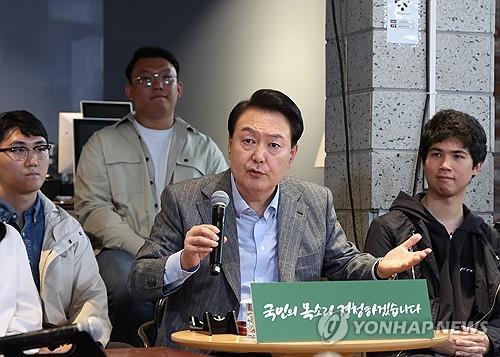- California Assembly OKs highest minimum wage in nation
- S. Korea unveils first graphic cigarette warnings
- US joins with South Korea, Japan in bid to deter North Korea
- LPGA golfer Chun In-gee finally back in action
- S. Korea won’t be top seed in final World Cup qualification round
- US men’s soccer misses 2nd straight Olympics
- US back on track in qualifying with 4-0 win over Guatemala
- High-intensity workout injuries spawn cottage industry
- CDC expands range of Zika mosquitoes into parts of Northeast
- Who knew? ‘The Walking Dead’ is helping families connect
Gov’t to announce countermeasures against banks’ monopoly: sources
The government is poised to announce a series of measures later this year to break the monopoly held by banks as they have been raking in record profits from interest income, according to sources from the presidential office on Friday.
This decision follows President Yoon Suk Yeol’s strong criticism of the monopoly structure among local lenders, as banks have reported all-time high earnings due to increased interest margins amid the central bank’s hawkish rate hikes.
Yoon expressed the concerns about the situation during a meeting with small-sized business owners in Seoul earlier this month, pledging the government’s commitment to addressing practices that potentially harm the vulnerable.
According to the Financial Supervisory Service, the country’s five major banks recorded a net profit of 15.65 trillion won (US$11.89 billion) for the first three quarters of 2023, following record-high profits for 2022.
The presidential office and the Cabinet are currently reviewing ways to improve the monopoly and are expected to announce the measures within the year, they said.
The proposed improvements include promoting competition among local banks to reduce market interest rates, as well as expanding financial infrastructure to prevent individuals with low credit ratings, mostly the younger generation, from suffering from high-interest rates, the source said.
However, experts are divided on the practicality of banks lowering their interest rates, citing the structure of the global economy.
“Various unnecessary costs and other binding conditions (imposed by the banks) should be eliminated, such as abolishing early redemption fees,” said a financial expert who requested anonymity.
Meanwhile, the presidential office reportedly opposes the main opposition Democratic Party’s push to introduce the so-called windfall tax for banks. A windfall tax is a one-time surtax imposed on companies deemed to have made unreasonably high profits.
The government believes that a windfall tax does not align with the country’s corporate tax system and is not in line with a market economy, the source said.












